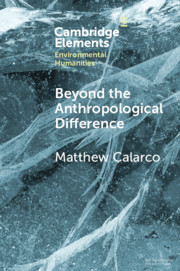Element contents
Beyond the Anthropological Difference
Published online by Cambridge University Press: 04 July 2020
Summary
- Type
- Element
- Information
- Online ISBN: 9781108862769Publisher: Cambridge University PressPrint publication: 30 July 2020
References
- 20
- Cited by

